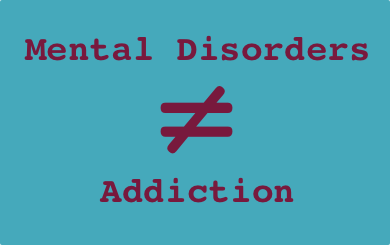I’ve been spending a lot of time analyzing the evidence for/against the “underlying causes” or “self-medication” model of addiction (for the latest edition of the Saint Jude Program textbook). Briefly, this is the idea that people’s other psychological problems/disorders/mental illnesses cause them to use substances and to be “addicted.” Stress, anxiety, depression, unhealed “trauma”, and various mental illnesses are mentioned as causes of continued substance use – and it is said that the substance use problem won’t stop unless these problems are properly addressed/treated.
 This seems to make sense, but is it true? I’ll be presenting various articles on this topic in due time, but for now, here’s one piece of evidence that can be used to argue strongly against this model of addiction. The NESARC study was a massive epidemiological research project carried out by the US government. It surveyed over 40,000 people in 2002. As has been mentioned many times on this site, it shows that most people get over their substance use problems, and most do it without treatment, and that treatment doesn’t increase odds of “recovery” from substance use problems. But more data has trickled out from this study over the years. A paper released in 2011 shows that several categories of mental disorders have little to nothing to do with whether or not people “recover from addiction.”
This seems to make sense, but is it true? I’ll be presenting various articles on this topic in due time, but for now, here’s one piece of evidence that can be used to argue strongly against this model of addiction. The NESARC study was a massive epidemiological research project carried out by the US government. It surveyed over 40,000 people in 2002. As has been mentioned many times on this site, it shows that most people get over their substance use problems, and most do it without treatment, and that treatment doesn’t increase odds of “recovery” from substance use problems. But more data has trickled out from this study over the years. A paper released in 2011 shows that several categories of mental disorders have little to nothing to do with whether or not people “recover from addiction.”
The following is an edited excerpt of some of my analysis for the SJP:
[NESARC showed] that people do get over [substance use] problems, equally, whether or not they have various mood disorders and/or anxiety disorders. The study measured whether people had the following Mood and Anxiety disorders:
Mood disorders included DSM-IV primary major depressive disorder (MDD), dysthymia and bipolar disorders. Anxiety disorders included DSM-IV primary panic disorder (with and without agoraphobia), social anxiety disorder, specific phobias and generalized anxiety disorder.
In an analysis of nicotine, cannabis, alcohol, and cocaine users (in which a vast majority were diagnosed with mood and anxiety disorders), the researchers found that:
No association was observed between mood and anxiety disorders and dependence remission for any of the substances assessed.
So, not only was it found that conditions like depression, bipolar, and anxiety (stress), do not cause people to “stay addicted” – a correlation wasn’t even found either. So as much as these conditions may be experienced by people with substance use problems, they simply do not correlate with either their ability or probability of changing their substance use habits.
Other findings in NESARC for comorbid disorders were: Personality disorders were found to be associated with lower probability of remission from alcohol and cannabis use disorders. However, in the case of alcohol, probability of remission was decreased by only 13% – just barely reaching clinical significance [which means that the observed correlation is almost due to chance]. Conduct disorders were only associated with remission from cannabis disorders – and actually increased probability of remission! However, with both of these results, we must remind our readers they represent only probability of remission – not ability. That is, they don’t establish that these disorders have any causative powers over whether one chooses to use substances or not.
Lopez-Quintero, C., Hasin, D. S., de los Cobos, J. P., Pines, A., Wang, S., Grant, B. F., & Blanco, C. (2011). Probability and predictors of remission from lifetime nicotine, alcohol, cannabis, or cocaine dependence: Results from the National Epidemiologic Survey on Alcohol and Related Conditions. Addiction (Abingdon, England), 106(3), 657–669. LINK
The above and much more research will be presented in the appendices of the Saint Jude Program textbook because we are dedicated to providing our guests with real information they can use to empower themselves to change. We do not argue that people shouldn’t address or get help for such problems – we only seek to show them that such problems needn’t be an obstacle to making the choice to change their substance use habits. While the treatment industry is busy teaching a perceived connection between these issues (that leaves people feeling as if they’re always on the very of “relapse”) that only compounds people’s substance use problems, The Saint Jude Program is offering people the knowledge needed to break those chains, and find more effective and rewarding personal choices.
I must remind that this blog is not officially associated with the Saint Jude Retreats, and that all of the opinions here do not necessarily reflect those of that organization.

Although I no longer agree with some of the information I got in treatment, it’s still an experience I smile on. I could express myself to others in a group who immediately “got me.” I might have experienced that comfort in other ways. Part of that scene is just teaching: yes, you can structure all your time. I keep watching your site, and I hope you keep it up.